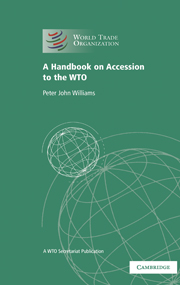Book contents
- Frontmatter
- Contents
- List of boxes and tables
- Foreword
- List of abbreviations and acronyms
- Introduction and summary
- Chapter 1 Accession in perspective
- Chapter 2 The basic rules
- Chapter 3 Technical assistance and training for acceding countries
- Chapter 4 The accession process: the procedures and how they have been applied
- Chapter 5 Substance of accession negotiations
- ANNEXES
- Annex 1 Statistical survey
- Annex 2 WTO provisions on accession
- Annex 3 Ministerial declarations (accession-related paragraphs)
- Annex 4 Guidelines for accession of least-developed countries
- Annex 5 Documentation and timeline for completed accessions
- Annex 6 Basic factual information to be supplied
- Annex 7 Supplementary factual information
- Annex 8 Formats for initial tariff offer and for schedule of concessions and commitments on goods
- Annex 9 Drafting a services Schedule
- Annex 10 Text of decisions on accession and accession protocols
- Annex 11 List of WTO agreements and associated legal instruments
- Annex 12 Overview of protocol commitments
- Annex 13 Suggested formats for Legislative Action Plans
- Annex 14 Agricultural tariff rate quotas and special safeguards
- Annex 15 Sectoral initiatives
Annex 3 - Ministerial declarations (accession-related paragraphs)
Published online by Cambridge University Press: 05 March 2012
- Frontmatter
- Contents
- List of boxes and tables
- Foreword
- List of abbreviations and acronyms
- Introduction and summary
- Chapter 1 Accession in perspective
- Chapter 2 The basic rules
- Chapter 3 Technical assistance and training for acceding countries
- Chapter 4 The accession process: the procedures and how they have been applied
- Chapter 5 Substance of accession negotiations
- ANNEXES
- Annex 1 Statistical survey
- Annex 2 WTO provisions on accession
- Annex 3 Ministerial declarations (accession-related paragraphs)
- Annex 4 Guidelines for accession of least-developed countries
- Annex 5 Documentation and timeline for completed accessions
- Annex 6 Basic factual information to be supplied
- Annex 7 Supplementary factual information
- Annex 8 Formats for initial tariff offer and for schedule of concessions and commitments on goods
- Annex 9 Drafting a services Schedule
- Annex 10 Text of decisions on accession and accession protocols
- Annex 11 List of WTO agreements and associated legal instruments
- Annex 12 Overview of protocol commitments
- Annex 13 Suggested formats for Legislative Action Plans
- Annex 14 Agricultural tariff rate quotas and special safeguards
- Annex 15 Sectoral initiatives
Summary
SINGAPORE MINISTERIAL DECLARATION
WTO document WT/MIN(96)/DEC
Adopted on 13 December 1996
8. It is important that the 28 applicants now negotiating accession contribute to completing the accession process by accepting the WTO rules and by offering meaningful market access commitments. We will work to bring these applicants expeditiously into the WTO system.
GENEVA MINISTERIAL CONFERENCE
WTO document WT/MIN(98)/DEC/1
Adopted on 20 May 1998
7. We welcome the WTO Members who have joined since we met in Singapore: Congo, Democratic Republic of Congo, Mongolia, Niger and Panama. We welcome the progress made with 31 applicants currently negotiating their accession and renew our resolution to ensure that the accession processes proceed as rapidly as possible. We recall that accession to the WTO requires full respect of WTO rules and disciplines as well as meaningful market access commitments on the part of acceding candidates.
DOHA MINISTERIAL CONFERENCE
WTO document WT/MIN(01)/DEC/1
Adopted on 14 November 2001
9. We note with particular satisfaction that this Conference has completed the WTO accession procedures for China and Chinese Taipei. We also welcome the accession as new Members, since our last Session, of Albania, Croatia, Georgia, Jordan, Lithuania, Moldova and Oman, and note the extensive market-access commitments already made by these countries on accession. These accessions will greatly strengthen the multilateral trading system, as will those of the 28 countries now negotiating their accession.
- Type
- Chapter
- Information
- A Handbook on Accession to the WTOA WTO Secretariat Publication, pp. 142 - 143Publisher: Cambridge University PressPrint publication year: 2008



